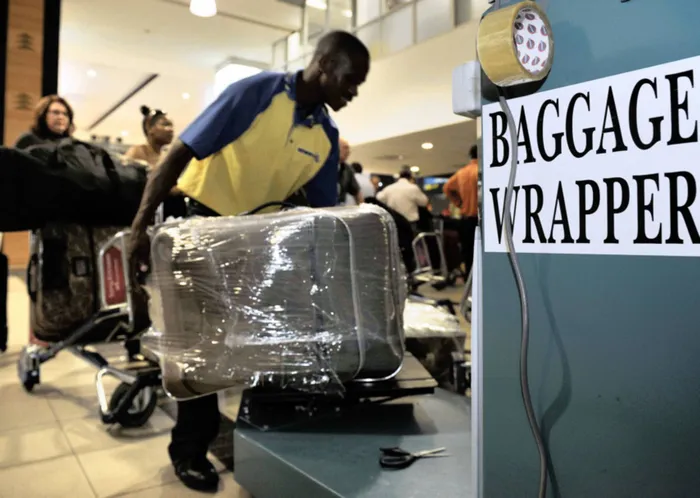Baggage theft declines

4128 09.10.15 Although new security measures at OR Tambo International have reduced baggage pilfering by about 60% to 12 bags a day out of 24000 since 2006, passengers still carry the perception that their luggage is not safe. With approximately 24000 bags a day currently going through the airport, that number is set to rise to about 50000 bags a day by the time of the 2010 Soccer World Cup. Picture: Cara Viereckl 4128 09.10.15 Although new security measures at OR Tambo International have reduced baggage pilfering by about 60% to 12 bags a day out of 24000 since 2006, passengers still carry the perception that their luggage is not safe. With approximately 24000 bags a day currently going through the airport, that number is set to rise to about 50000 bags a day by the time of the 2010 Soccer World Cup. Picture: Cara Viereckl
One of the reasons most Capetonians hate changing planes in Joburg is its reputation for baggage theft. So it’s encouraging to hear that this high rate of pilfering has fallen.
Siza Mzimela, chief executive of SAA, succeeded in persuading all the companies using OR Tambo International Airport, including Airports Company South Africa (Acsa), to launch a united campaign against it instead of taking their own separate precautions.
As a result, she reported to parliament that pilfering from SAA passengers’ baggage has fallen from 80 bags in every 1 000 in August two years ago to 35 in every 1 000 last December. Hopefully the drop is just as great for passengers from other airlines.
Mzimela said SAA was also using its large aircraft bought for longer routes on some domestic flights, specifically between Cape Town and Joburg, rather than waste money by keeping them sitting on the tarmac between international and regional flights.
SAA which, like most airlines worldwide, needs new generation aircraft as a result of a 40 percent rise in fuel costs, is asking the government for capital to be able to afford them and to increase its route network and the number of flights on its new service to Beijing.
This is bound to cause an outcry by privately owned SA airlines who naturally object to their taxes being used to finance a competitor in the domestic and regional markets while they have to raise money to modernise their own fleets. But Mzimela points out that the government is the sole shareholder in SAA and it is normal for shareholders to capitalise their companies.
SAA has been bolstered by multi-million injections from the government in the past, to pay off debts as a result of decisions made by previous chief executives.
Mzimela is the most competent CEO the airline has had for many years and pointed out to me that the airline has never been capitalised properly in order to expand its activities as opposed to paying off debt. Answering questions from MPs, she said most of SAA’s aircraft were leased and not owned because the airline could not afford to buy them outright. However, this made it simpler to replace them with newer aircraft when the time came.
The truth of this was shown later the same day when Comair, announcing its results for the six months to December, disclosed a substantial loss on the sale of three ageing aircraft which are being replaced by larger new generation planes that use less fuel and create less pollution. Many airlines, worldwide, are acquiring new fleets for the same reason.
Flight demand rises
In spite of rising costs, at least some of which have to be passed on to passengers, a fall in demand for flights has been reversed in the past two months.
The International Air Transport Association (IATA) has been reporting this trend in its monthly surveys. Eric Venter, chief executive of Comair, said passenger numbers here had risen by an average of three percent. Demand for Comair flights, which presumably means its low-cost division as well as the full service BA/Comair , has risen by eight percent.
Some airlines are upgrading their services to attract more customers or retain those they have in today’s competitive conditions. BA recently announced that it was upgrading its first class and economy class after having recently done the same for business class.
Now Virgin Atlantic Airways, which flies between London-Heathrow and Cape Town in our summer and between London and Joburg all year round, has announced that it is investing £100 million (R1222.44) in upgrading its business class, known as Upper Class.
It will be launched on the airline’s new Airbus A 330-300 aircraft, the first of which will be delivered in April, beginning with the competitive trans-Atlantic route. Many South Africans travel to the US by way of London and will experience it before it comes to this country. - Weekend Argus